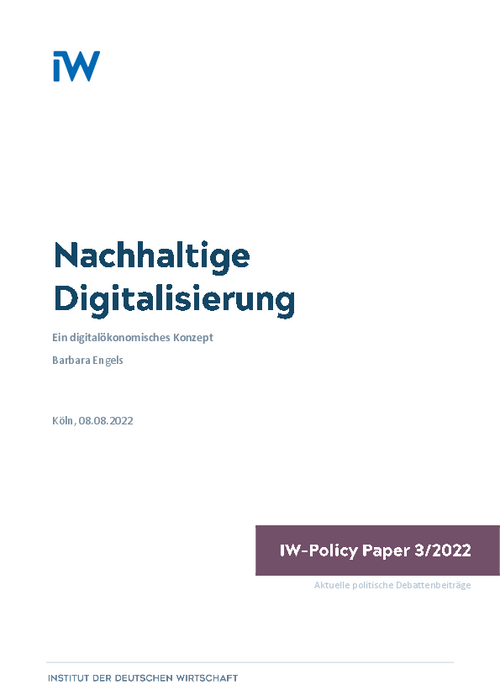Data usage, networking, automation and autonomization: digitalization is omnipresent. But what is digitalization for? It is not an end in itself. It is intended to serve people, to help them achieve greater prosperity.

Sustainable Digitalization: A digital economic concept

Data usage, networking, automation and autonomization: digitalization is omnipresent. But what is digitalization for? It is not an end in itself. It is intended to serve people, to help them achieve greater prosperity.
Prosperity can be measured with quantitative and qualitative indicators. In any case, more and more fairly distributed prosperity is only possible if economic, social and ecological sustainability is guaranteed. Digitalization that leads to more and equitably distributed prosperity is sustainable digitalization. It is a digitalization that is designed in such a way that society and the economy benefit from it in the long term. This policy paper develops precisely this concept of sustainable digitalization.
Digitalization can have both positive and negative effects economically and socially, so it harbors both opportunities and risks. Sustainable digitalization is digitalization that maximizes the probability and the extent of the opportunities. The probability and the extent of the risks, on the other hand, are minimized. For example, digitalization is designed in such a way that an opportunity associated with the use of data – namely to analyze and optimize production processes – is exploited, while a risk associated with the use of data - the vulnerability of these processes regarding data manipulation – is reduced. To achieve this, fundamental design questions of digitalization must be answered from a scientific perspective. One discipline that can make a particular contribution to this is digital economics. In the example of data use in the production process, the question needs to be answered how data can be used as comprehensively as possible without jeopardizing its security. This then requires a more detailed answer as to how data governance can be designed and implemented in a company.
This policy paper compares the opportunities and risks of digitalization based on its three pillars of data usage, networking, automation and autonomization and, based on this, develops questions that need to be answered from a digital economics perspective in order to ensure sustainable digitalization. To this end, the individual thematic areas of digital economics, including the data economy, digital markets, digital education and digital labor, are presented. Thus, this policy paper forms a starting point for extensive further research on the cross-cutting topics of digitalization and sustainability.
Understanding and shaping sustainable digitalization that serves people requires ongoing potential and risk assessments from different perspectives, as well as reliable monitoring and adaptive governance. An interdisciplinary research approach therefore makes sense. Accordingly, the digital economics perspective presented in this paper should be combined with the perspectives of other disciplines.


Sustainable Digitalization: A digital economic concept

More on the topic

Artificial Intelligence – Will Boosted Productivity Lead to Better Pay?
Artificial intelligence (AI) is already being used in a wide variety of applications both inside and outside the corporate world.
IW
Obstacles to Data Sharing – An Outline of Recent Developments with Policy Recommendations
The increasing networking of production processes and the ability of artificial intelligence to analyse ever larger amounts of data offer enormous potential for the German economy. To exploit this potential fully, however, data must be shared.
IW